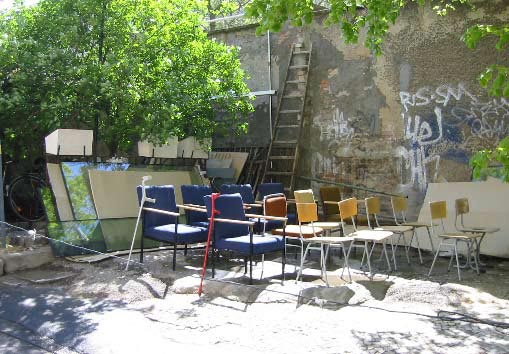ETH Zurich – Institute for Urban Design
HIL H44.1 – Stefano-Franscini-Platz 5 – 8093 Zurich
contact

„Creatives“ are often and without knowing assisting urban renewal. This way, many decayed city quarters, which have fallen into oblivion have experienced an unexpected rise, causing attention far beyond their own limits. As for example Soho (London), Williamsburg (New York), Berlin Mitte and Prenzlauer Berg (Berlin), Schanzenviertel (Hamburg), Langstrasse (Zurich) to name just the most popular examples.
Low rents, inspiring ambience as well as spatial and social niches to practice alternative lifestyles are often the local qualities attracting the first wave of young creative professionals. These people don’t have much financial capital, yet they have much “creative capital” to invest in their urban environments: in studios and galleries, clubs and bars, startup firms and alternative retail. By this means “creatives” are driving urban renewal in many ways. They are laying the foundations for new urban economies (the so called creative industries) and they are creating attractive and vibrant urban spaces.
Under the influence of American economist Richard Florida the idea of the creative industry being one of the major economic foundations of the 21st century has become one of the most popular arguments in the field of contemporary urban development. Cities all over the world are trying to improve their competitive capacity by creating urban environments, which are assumed to attract and bind the so called creative class.
However, it is heavily debated, how to establish appropriate environments by means of urban planning and what long-term effects these plans may have for the creative milieu and for local inhabitants alike. In many such quarters (e.g. Gängeviertel, Hamburg; Prenzlauer Berg, Berlin; Langstrasse, Zurich) conflicts between inhabitants and creative professionals on one hand and public and private stakeholders on the other are indicating the urgent need to search for solutions.
This lecture series takes on this urgency. International practitioners and theorists will report from cities around the world and will discuss their theories, projects and prognoses.
Lecture hall and time
HCI G7
Thursdays, 10:00 to 12:00 am
Dates and lecturers
22.9.
Prof. Kees Christiaanse
ETH Zurich / KCAP Architects and Planners, Rotterdam
29.9
Dr. Ares Kalandides
Urban planner, INPOLIS, Berlin
6.10.
Bart Reuser
Next Architects, Amsterdam
13.10.
Ying Zhou
Architektin und Researcher, FCL Singapur/ETH Zürich
20.10.
Tim Rieniets
ETH Zürich
27.10.
SEMINAR WEEK
3.11.
Martin Heller
Curator und cultural enterpriser, Heller Enterprises, Zurich
10.11.
Prof. Dr. Stephan Bone-Winkel
Real estate development, BEOS GmbH, Berlin
University Regensburg
17.11.
Prof. Dr. Arnold Reijndorp
Sociologist, University Amsterdam
24.11.
Damon Rich
Founder of Center for Urban Pedagogy (CUP), New York
Urban planner, Newark
1.12. Sum Up
Tim Rieniets / Anne Mikoleit
ETH Zurich
8.12. Colloquium
Prof. Kees Christiaanse, ETH Zurich
Philipp Klaus, INURA Institute Zurich
And representatives of the city administration of Zurich
This website has been archived and is no longer maintained.